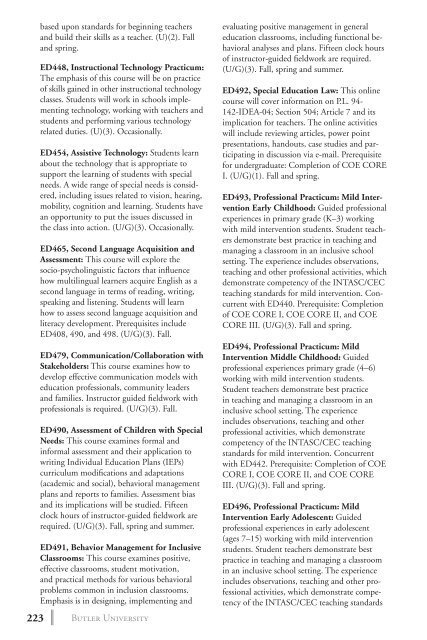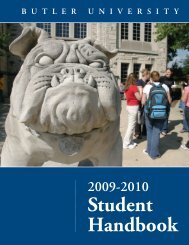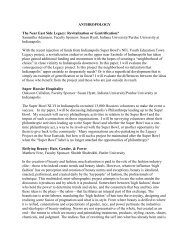2 0 1 3 bulletin - Butler University
2 0 1 3 bulletin - Butler University
2 0 1 3 bulletin - Butler University
Create successful ePaper yourself
Turn your PDF publications into a flip-book with our unique Google optimized e-Paper software.
223<br />
based upon standards for beginning teachers<br />
and build their skills as a teacher. (U)(2). Fall<br />
and spring.<br />
ED448, Instructional Technology Practicum:<br />
The emphasis of this course will be on practice<br />
of skills gained in other instructional technology<br />
classes. Students will work in schools implementing<br />
technology, working with teachers and<br />
students and performing various technology<br />
related duties. (U)(3). Occasionally.<br />
ED454, Assistive Technology: Students learn<br />
about the technology that is appropriate to<br />
support the learning of students with special<br />
needs. A wide range of special needs is considered,<br />
including issues related to vision, hearing,<br />
mobility, cognition and learning. Students have<br />
an opportunity to put the issues discussed in<br />
the class into action. (U/G)(3). Occasionally.<br />
ED465, Second Language Acquisition and<br />
Assessment: This course will explore the<br />
socio-psycholinguistic factors that influence<br />
how multilingual learners acquire English as a<br />
second language in terms of reading, writing,<br />
speaking and listening. Students will learn<br />
how to assess second language acquisition and<br />
literacy development. Prerequisites include<br />
ED408, 490, and 498. (U/G)(3). Fall.<br />
ED479, Communication/Collaboration with<br />
Stakeholders: This course examines how to<br />
develop effective communication models with<br />
education professionals, community leaders<br />
and families. Instructor guided fieldwork with<br />
professionals is required. (U/G)(3). Fall.<br />
ED490, Assessment of Children with Special<br />
Needs: This course examines formal and<br />
informal assessment and their application to<br />
writing Individual Education Plans (IEPs)<br />
curriculum modifications and adaptations<br />
(academic and social), behavioral management<br />
plans and reports to families. Assessment bias<br />
and its implications will be studied. Fifteen<br />
clock hours of instructor-guided fieldwork are<br />
required. (U/G)(3). Fall, spring and summer.<br />
ED491, Behavior Management for Inclusive<br />
Classrooms: This course examines positive,<br />
effective classrooms, student motivation,<br />
and practical methods for various behavioral<br />
problems common in inclusion classrooms.<br />
Emphasis is in designing, implementing and<br />
<strong>Butler</strong> <strong>University</strong><br />
evaluating positive management in general<br />
education classrooms, including functional behavioral<br />
analyses and plans. Fifteen clock hours<br />
of instructor-guided fieldwork are required.<br />
(U/G)(3). Fall, spring and summer.<br />
ED492, Special Education Law: This online<br />
course will cover information on P.L. 94-<br />
142-IDEA-04; Section 504; Article 7 and its<br />
implication for teachers. The online activities<br />
will include reviewing articles, power point<br />
presentations, handouts, case studies and participating<br />
in discussion via e-mail. Prerequisite<br />
for undergraduate: Completion of COE CORE<br />
I. (U/G)(1). Fall and spring.<br />
ED493, Professional Practicum: Mild Intervention<br />
Early Childhood: Guided professional<br />
experiences in primary grade (K–3) working<br />
with mild intervention students. Student teachers<br />
demonstrate best practice in teaching and<br />
managing a classroom in an inclusive school<br />
setting. The experience includes observations,<br />
teaching and other professional activities, which<br />
demonstrate competency of the INTASC/CEC<br />
teaching standards for mild intervention. Concurrent<br />
with ED440. Prerequisite: Completion<br />
of COE CORE I, COE CORE II, and COE<br />
CORE III. (U/G)(3). Fall and spring.<br />
ED494, Professional Practicum: Mild<br />
Intervention Middle Childhood: Guided<br />
professional experiences primary grade (4–6)<br />
working with mild intervention students.<br />
Student teachers demonstrate best practice<br />
in teaching and managing a classroom in an<br />
inclusive school setting. The experience<br />
includes observations, teaching and other<br />
professional activities, which demonstrate<br />
competency of the INTASC/CEC teaching<br />
standards for mild intervention. Concurrent<br />
with ED442. Prerequisite: Completion of COE<br />
CORE I, COE CORE II, and COE CORE<br />
III. (U/G)(3). Fall and spring.<br />
ED496, Professional Practicum: Mild<br />
Intervention Early Adolescent: Guided<br />
professional experiences in early adolescent<br />
(ages 7–15) working with mild intervention<br />
students. Student teachers demonstrate best<br />
practice in teaching and managing a classroom<br />
in an inclusive school setting. The experience<br />
includes observations, teaching and other professional<br />
activities, which demonstrate competency<br />
of the INTASC/CEC teaching standards
















